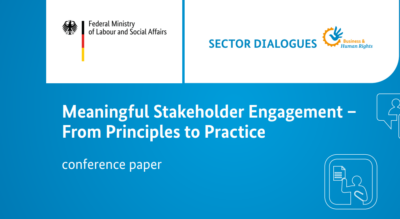The new guideline by the Partnership for Sustainable Textiles provides practical suggestions for improving inclusion along the entire supply chain in the textile sector. Suggestions also extend to suppliers and both large companies and micro–enterprises. Important concepts are presented, a step-by-step approach with good practice tips, checklists and a flowchart of the process are explained, and existing advisory and support services are listed. The guideline exists in English and German in a long and a short version.
It is emphasised that inclusive employers try to make all areas of work accessible to all people. There are various challenges in creating inclusive workplaces, as people with different needs also require adapted, pragmatic approaches to inclusion. The overall societal goal, in accordance with human rights, is to enable all people with special needs to lead an equitable and participative life in an environment in which they can develop their needs, abilities and preferences. This can also be relevant in the context of practising due diligence in the supply chain.
Inclusion along the supply chain benefits people with special needs, society as a whole and individual companies. When people with special needs can participate in economic life, it increases their earning and consumption opportunities, as poverty and special needs are often interdependent. Diversity in a company can stimulate new ideas and bring new competencies into a company. The workplace environment can likewise improve for all employees and a company can benefit from an enhanced image and possibly new funding sources.



